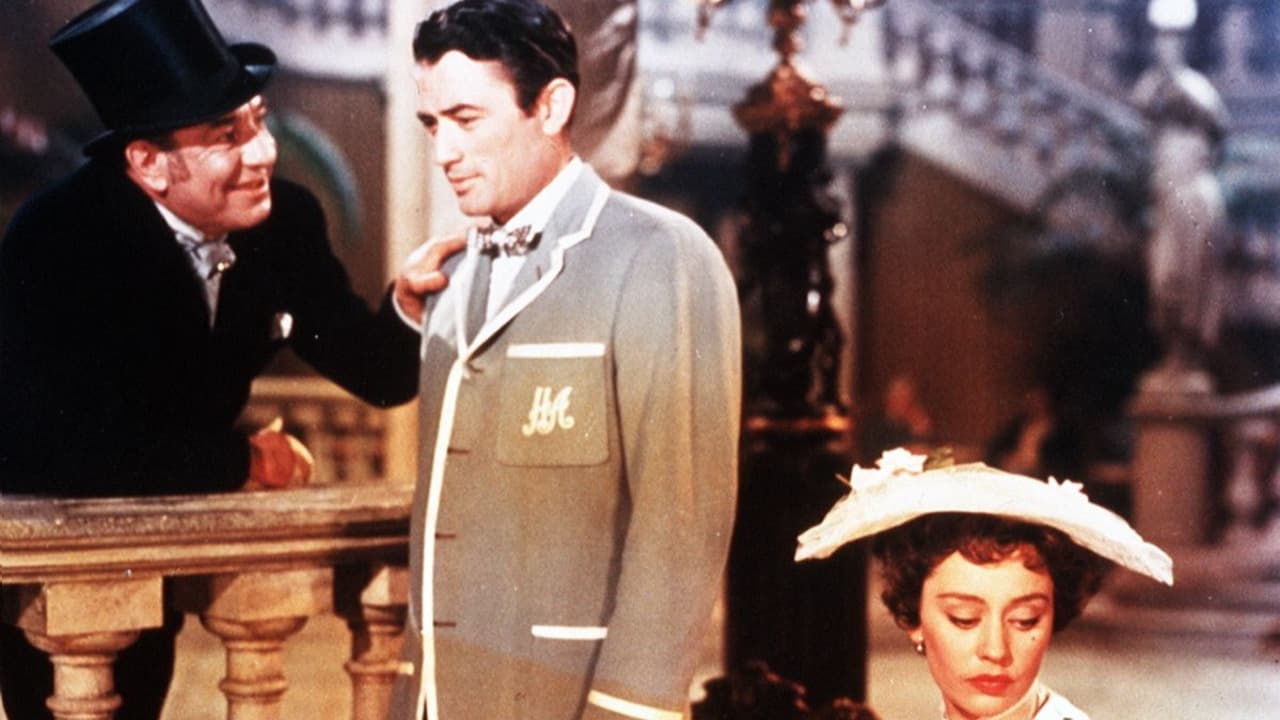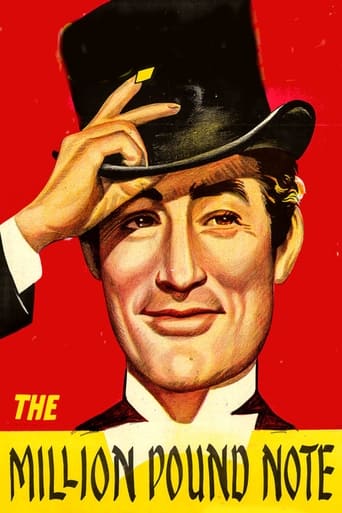

Imagine a cross between Brewster's Millions and Trading Places, and you'll get Gregory Peck's Man with a Million. Wilfrid Hyde-White and Ronald Squire, are rich and idle brothers looking for a little fun. They come up with a bet: give a total stranger a million pound note, and tell him that if he lasts a month without spending it, they'll give him a good job. One man thinks it's the knowledge of having untouchable wealth that will propel the pauper into the high life, and the other thinks he'll have to spend it to get ahead. Greg plays the Man with a Million, or in other countries' release, the man with The Million Pound Note.If you like those types of movies, you'll like this one, since it doesn't stray very far from the usual mold. There's a moral debate, lots of jokes, lots of satire about the upper class—it stems from a Mark Twain story—and a fair amount of silliness. Plus, it's a period piece and Greg looks very handsome in his beautiful clothes, so you'll have plenty of eye candy. If you're looking for a more serious Gregory Peck movie, you've got tons to choose from, but it's nice to see him step out from his Atticus Finch person and have some silly fun every once in a while.
... View MoreI watched this movie after reading Mark Twain's novel. The novel is good, typical Mark Twain's style: simple and sharp. But make a full-length movie from such a short story is not doing more than it can. Therefore the first two-thirds of the movie seems rather silly. For example, the note being windblown scene is naive. And the movie's changing the inventor of the idea of selling the mine using Henry's name form Henry to Lloyd really annoyed me. However, from that onwards the last one-third part of Henry missing the million pound note was really a U-turn and lifts the whole movie a level up. This is a good original idea and it does save the movie largely.
... View MoreI almost gave this film a 7--it was very close. This film is based closely on the Mark Twain story of the same name.The film begins with Gregory Peck--alone and penniless in London. He doesn't even have the money for a meal or a place to stay. It's so bad that when a little kid throws a partially eaten pear on the ground that he's tempted to pick it up and eat it...when out of the blue, two gentlemen call to him from the balcony above. He is escorted up and they treat him kindly. After inquiring about his circumstances, they assure him that they'll make him a loan and not to worry. They hand him an envelope and instruct him to go buy himself dinner.A cursory look in the envelope shows that there is indeed money inside, but when it comes time to pay the bill, he discovers that it's a million pound note (a fictional amount, by the way) and the people in the restaurant cannot possibly make change. However, they don't seem the least bit interested in his paying and immediately extend him any credit he wants. The note along with the money, by the way, tells him that he's to have the money at no interest and he's expected to return it in one month.Later, when he goes to buy a decent set of clothes, they treat him like a bum--until they see the million pound note--at which case, once again, he's given unlimited credit and they dote on him. The same thing then happens when he goes to stay at a fancy nearby hotel. Word soon spreads all over London and now suddenly EVERYBODY wants to be his friend and extend him credit.There's a lot more that occurs in the film--particularly in regard to how the Brits view social class and wealth as well as the whole idea of being a celebrity for celebrity's sake. It's all rather droll and mildly amusing, though not as wonderful as it could have been. I am having a hard time putting my finger on why, as Gregory Peck was terrific. Perhaps it's the way everything comes together perfectly in the end--regardless, it's a very good film but one that left me feeling a tad...well...flat.
... View MoreOliver and Roderick Montpellier, two English brothers, make a bet that any man given a one million pound note, can live off the fat of the land just by showing off the good fortune of having it in his possession. Then, if by the end of a month, if he can show the intact bill, he will indeed be a man worthy of whatever fortunes might befall on him because of the sheer luck of proving the brothers right.The lucky recipient of the note is one Henry Adams, an American in London who is just a poor man with no money, or prospects of a job in the near future. He tests his good fortune when he decides to dine at a modest restaurant. As the bill comes, he shows his one million pound note, which of course, the owner can't possibly change. The meal is free.Henry Adams then discovers how he can go through his present situation relying on the fact that he is a millionaire, without really being one. He is given a set of smart clothes, a suite at one of the best hotels in town, and an introduction to high society, something that is not always available to Americans, even rich ones, as Henry appears to be.This delightful comedy of 1954 was a total surprise. The film, made in England at the famous Pinewood studios, was directed by Ronald Neame. Based on a Mark Twain story, which we haven't read, it counts on the great work of Gregory Peck, a man that was one of the most charismatic performers during his years in the cinema. Mr. Peck is the whole movie; it's unimaginable to think of any other actor playing Henry Adams.The supporting cast shows familiar faces of consummate English players who contribute to create the Edwardian atmosphere. Ronald Squire and Wilfrid Hyde-White are the Montpellier brothers, whose bet trigger the action. Reginald Beckwith is the mute valet who sticks by Henry through thick and thin. Jane Griffiths plays Portia, the woman that conquers Henry Adams heart. Also in the cast we saw Hugh Griffith, in a non-credited role. Joyce Grenfell, another delightful character actress, has some brilliant moments as the Duchess of Cromarty.An enjoyable movie. Catch if it ever plays on your classic movie channel. You won't be disappointed!
... View More